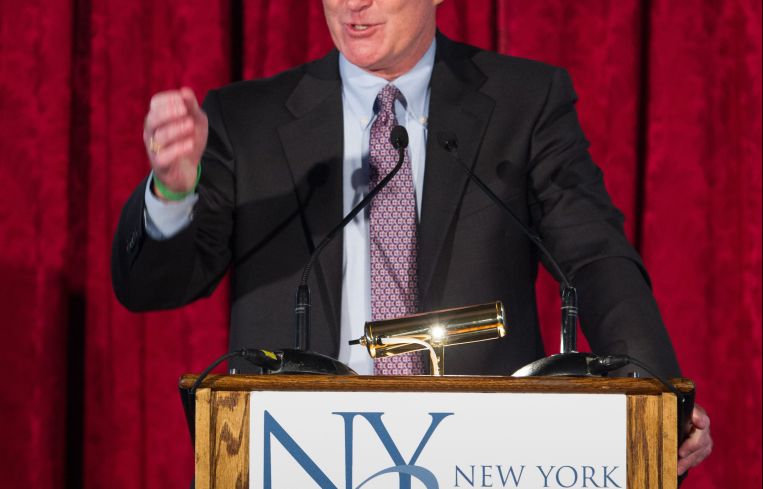Cap NYC Property Taxes, Get It Together on 421a: State Senate Leader
By Terence Cullen and Liam La Guerre June 29, 2016 1:27 pm
reprints
State Senate Majority Leader John Flanagan renewed calls for a property tax cap in New York City today and referred to the failed negotiations over the expired 421a tax abatement as a “missed opportunity.”
The Long Island Republican made the remarks this morning as he addressed the construction industry at the New York Building Congress’ networking event at The Metropolitan Club in Midtown. They come months after the GOP-controlled State Senate tried to pass a 2 percent property tax cap on New York City buildings, which fizzled in the Democratic-run Assembly.
“Property taxes are still the number one issue,” Flanagan told Commercial Observer after delivering his speech. “It has a direct correlation to jobs, availability of access [and] opportunities. It doesn’t matter whether it’s a rural community in Upstate New York or the City of New York.”
Flanagan acknowledged that the tax cap would again be a hard sell in Albany and wasn’t sure if the cap legislation would be introduced next year.
“I hope so,” Flanagan said on a potential passage of the bill when the session resumes next January. “But it’s not going to be easy.”
Property tax policy is the sole levy that the City Council has autonomy over. But the State Legislature, which controls all other tax codes for the city, has the ability to cap taxes in the Big Apple.
This January, the chamber passed a longshot cap that would keep property taxes below 2 percent or the consumer price index, whichever is lower, to stay consistent with the 2011 one imposed on the rest of New York State. Republicans argued at the time that it would save New Yorkers $4.5 billion by 2019.
For the “average residential homeowner in the City of New York, taxes have gone up $1,000 [annually] since 2010,” Flanagan said during his speech. “A lot of times what happens is we talk about affordable housing, but not about homeowners themselves. The reality is that property taxes are going to be crushing the City of New York.”
City Hall officials have said the bigger issue is reforming the property tax code in general. In January, Mayor Bill de Blasio said during testimony for the state budget that the property tax cap would end up hurting the city in the end. When reached for comment after Flanagan’s remarks, a mayoral spokesman said a “restrictive cap” would slash billions in crucial city services while New Yorkers were already paying a lower tax rate on one-, two- and three-family homes than the rest of the downstate region.
“Just about everyone agrees we need to rationalize this antiquated system so the burden is applied more fairly, as the inequities have grown over decades,” the spokesman, Austin Finan, said in an email. “It’s an issue that cuts across the state and city, and won’t be easily reformed.”
Mayoral officials have also argued that the city generates the bulk of the state’s revenue, while getting back little in return toward the municipal budget. City Comptroller Scott Stringer in January 2015 announced that revenues to the state increased 16 percent over a five-year period between 2009 and 2014, while funding back to the city dropped 10 percent over the same time, according to the New York Daily News.
The Real Estate Board of New York has also been in favor of reforming the tax code, which it believes hinders developing housing throughout the city.
“New York City’s property tax system is seriously flawed,” REBNY President John Banks said in a statement provided to Commercial Observer. “Among its many problems is that the level of taxation serves as a barrier to creating and maintaining below-market rental housing.”
The majority leader also declared that New York as a whole missed out on reforming the lucrative 421a tax break, which expired in January after the landlords and organized labor couldn’t agree on a prevailing construction wage. Flanagan called on Gov. Andrew Cuomo, who tied the salary agreement to the renewal of 421a, to “everyone in a room” to negotiate.
“On 421a, it’s a missed opportunity,” Flanagan said. “No one can provide greater leadership in this area than the governor of the State of New York. In my humble opinion, he puts everybody in a room, sits everybody down and tells everybody, ‘nobody is going home until things are negotiated and compromised,’ then I think we can get there.”
A Cuomo spokeswoman did not immediately return a request for comment.
The tax break, which has been considered key to developing affordable housing, almost got a second life during the end of this legislative session. A bill was introduced two weeks ago in the senate that would tie a prevailing wage to the abatement and require more below-market units at a given project. An assembly spokesman at the time called the bill a “non-starter” and organized labor took issue with the salaries proposed in the bill—deeming them too low, as CO reported at the time.
Finan, the mayoral spokesman, said it was up to the players in the state capitol to come up with a solution. “You break it, you fix it,” he said. “It’s on Albany to put the pieces of 421a back together again.”



